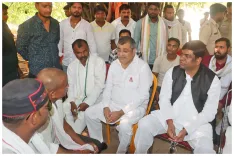How is the TN government Enhancing Grievance Redressal?

Synopsis
The Tamil Nadu government is taking significant steps to enhance public services by enforcing a new monthly reporting system for grievance redressal, ensuring timely acknowledgment and resolution of complaints, and fostering trust in public institutions.
Key Takeaways
- Mandatory monthly reporting of grievance actions.
- Grievances to be acknowledged within three days.
- Resolution of issues required within one month.
- Transparency through dedicated grievance registers.
- Monthly reviews by department heads to ensure compliance.
Chennai, June 14 (NationPress) In a pivotal initiative focused on enhancing citizen services, the Tamil Nadu government has mandated all department secretaries and district collectors to provide monthly reports outlining actions taken regarding public grievance petitions.
This action is part of a renewed commitment to accountability and the prompt resolution of complaints submitted to government offices, whether in person or via email.
As per official sources, the state’s Chief Secretary has issued explicit instructions to all departments to strictly comply with these new guidelines.
The directives stipulate that every grievance petition must be acknowledged within three days of receipt.
Additionally, departments are required to resolve the issues raised within one month.
To facilitate the process and ensure transparency, each government office must maintain a dedicated register for grievance petitions.
This register should adhere to the format specified in the recent Government Order (GO), which includes fields for the date of receipt, petitioner details, nature of grievance, action taken, and date of resolution.
Officials have been instructed to meticulously document each step taken on every petition within the register. The head of each office—be it a district collectorate, department headquarters, or local government branch—must conduct a monthly review of this register.
The goal of this review is to identify any unresolved petitions and guarantee that they are addressed without unnecessary delays.
The Chief Secretary has stressed that delays in submitting monthly status reports will not be tolerated. These reports must detail the number of petitions received, those resolved within the specified timeframe, and the actions taken regarding outstanding cases.
This initiative is part of the state government’s broader strategy to foster a more responsive and citizen-centric governance approach.
Officials are optimistic that this system will enhance public trust in institutions by ensuring that grievances are not only acknowledged but actively monitored until resolution. The new regulations also act as a caution to departments that have been slow or inconsistent in handling public concerns.
With the introduction of mandatory monthly reporting and accountability measures, the government aims to cultivate a culture of timely and efficient grievance redressal across all levels of administration.





